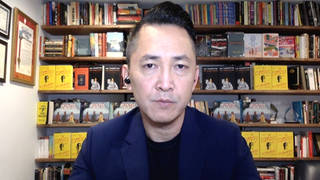
By Amy Goodman & Denis Moynihan
Q: “And babies?”
A: “And babies.”
These four words, broadcast by CBS News in 1969, had a profound impact on the American public, the Nixon presidency and the course of the Vietnam War. Questions about babies have arisen again at the White House, this time about thousands of immigrant children, some only months old, ripped from their parents and jailed in cages on the orders of President Trump.
That question, asked half a century ago, “And babies?” was posed by veteran investigative journalist Mike Wallace while interviewing a young Vietnam veteran named Paul Meadlo. “And babies,” Meadlo answered. He was an Army private who, along with scores of other U.S. soldiers, conducted a raid on March 16, 1968, attacking a Vietnamese village called My Lai.
What followed came to be known as the My Lai Massacre. U.S. soldiers slaughtered over 500 civilians over the course of the day. “They was begging and saying, ‘No, no.’ And the mothers was hugging their children and … well, we kept right on firing. They was waving their arms and begging,” Meadlo told Wallace.
Meadlo was brought to CBS by a young freelance reporter named Seymour Hersh, who was investigating the massacre. He tracked down Meadlo, got his story and convinced him to do the CBS interview. What Hersh uncovered about the My Lai Massacre haunts him to this day. Speaking on the “Democracy Now!” news hour about his new book, “Reporter: A Memoir,” Hersh said, “Instead of meeting the enemy, there were just families, women and children and old men. And so they began to murder them. They put them in ditches. And they raped. They killed. They threw babies up — this was hard for me to even, in the first year — and caught them on bayonets. Some of the stuff I kept out of the initial story, it was just so awful.”
He recalled, of Meadlo’s CBS appearance, “Mike Wallace, who’s tough as nails, asked him — he asked him five times in that interview, ‘And babies?’ Again, he kept on saying, ‘And babies?’”
Hersh later published the story, through the small anti-war Dispatch News Service, after several major U.S. media outlets turned down the story. It earned him the Pulitzer Prize in 1970.
Hersh sees parallels with how the press is finally covering the immigrant family separation crisis now. “This could be a turning point,” he said
Today we see photos of crying toddlers next to handcuffed parents, accompanied by an audio recording released by the news outlet ProPublica in which children are heard crying, “Mama! Papi!” while a guard mocked them, saying in Spanish: “Well, we have an orchestra here. What’s missing is a conductor.” Elected officials and the media have flocked to the U.S.-Mexico border region, demanding access to detention centers. Department of Homeland Security Secretary Kirstjen Nielsen was questioned at a White House press briefing, asked why her department had only released photos of jailed boys in cages over the age of 10, with no photos of girls or toddlers there. “Where are the girls? Where are the young toddlers?” she was repeatedly asked. Her confusion as to their whereabouts stoked even more furor.
Trump’s “zero tolerance” policy toward undocumented immigrants and asylum-seekers along the U.S. southern border, announced by Attorney General Jeff Sessions on April 6, allowed the Department of Homeland Security (DHS) and its Immigration and Customs Enforcement division (ICE) and Border Patrol to arrest adults whom they suspected of crossing the border without proper documentation, and to separate them from their children. The number of children kidnapped by DHS and ICE is over 2,300, The Intercept estimates over 3,700 have been taken since October.
Scores of immigrants rights activists across the country have been protesting Trump’s order since the day it was issued. The movement snowballed. Congress members demanded to see the children. Democratic and Republican governors began issuing executive orders withdrawing or preventing their National Guard troops from going to the border to assist DHS. Airlines joined in, refusing to transport children stripped away from their parents. By Wednesday, Trump issued an executive order, reversing his own decision. Families would not be separated moving forward.
But that does not solve the crisis for those thousands already snatched from their parents. There is no mechanism in place to reunite parents, some of whom have already been deported, with their children, who are still in cages, jails and hastily erected tent cities scattered around the country in 17 states.
Fifty years ago, four words broadcast nationally changed the course of the Vietnam War. Question: “And babies?” Answer: “And babies.” Four words heard this week, “Mama, Mama. Papi, Papi,” have exposed the cruelty of the Trump administration, and have powerfully changed the course of the immigration debate.











Media Options